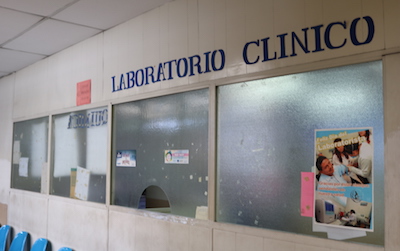Investigating Reproductive Health in El Salvador.
 “A reporter?” a 36-year-old Salvadoran asked. “Are you here to be amarillo?”
“A reporter?” a 36-year-old Salvadoran asked. “Are you here to be amarillo?”
“Amarillo?” I asked. “Yellow?”
“Reporters are amarillo when they walk up to someone with a knife in their side, and ask, ‘Are you ok?!’” he said, as he pantomimed shoving a microphone in my face.
A month earlier, I had tried to explain why I was going to El Salvador to my friend as we navigated Bay Area traffic on our way to SFO. “I’m going to go to a Catholic country and talk to people about their sex lives, in Spanish….” I said, staring straight ahead. And that’s when I may or may not have broken down into tears.
It’s safe to say that I arrived in El Salvador in way over my head.
Last spring, thanks to the encouragement of amazing professors and a phenomenal course load at SPH, I became interested in El Salvador. By 2017 the dreaded Zika crisis was fading from the headlines, but in its shadow, structural determinants of poor health outcomes remained.

A year earlier and in light of the outbreak, the Deputy Health Minister Eduardo Espinoza had “‘recommended” that women not get pregnant, saying, “We’d like to suggest to all the women of fertile age that they take steps to plan their pregnancies, and avoid getting pregnant between this year and next. We are giving a recommendation, it’s not prohibition or a birth control measure, [but] these children are going to need neurological help for the rest of their lives. They will have to get support, and they will change the family dynamic. Nobody wants a child with incapacities, so we are recommending people to reflect.”
This, in a country where reproductive health education is extremely limited, where contraception is hard to access, and where abortion is illegal under any circumstance and even a miscarriage can lead to 30 years in jail. If a government can ask women (no mention of men) to not get pregnant, it begs the follow-up question:
How?
From my desk in Boston, I got to work. I began researching and writing papers on gender-based violence, high rates of adolescent pregnancy, and decriminalizing abortion through policy change.
But more questions remained. Since Zika was the first virus that could be spread by both mosquitoes and sexual transmission, it presented a unique opportunity to incorporate family planning into disaster response. If this precedent was set, could it lead to long-term behavioral and structural changes in reproductive health education? And would these changes remain, even after Western media outlets packed their bags and moved on to the next disaster?
Could the Zika virus change the way that reproductive health education was handled in El Salvador?
It was this question that lead me to submit a proposal to the Pulitzer Center for Crisis Reporting, a non-profit journalism organization dedicated to supporting in-depth engagement with underreported global affairs. Every year Boston University’s Program for Global Health Storytelling brings together graduate students from journalism and public health to work with thePulitzer Center on their own projects. I felt incredibly lucky to receive the grant alongside fellow BU students Erica Andersen, Madeline Bishop, and Campbell Rawlins. As a group we were able to work from the Pulitzer Center in Washington, DC, this summer, learning from journalists and preparing for our trips before we said our goodbyes and went our separate ways.
The past month has been hard and draining and wonderful and surprising and inspiring—not necessarily all at the same time. I’ve talked to coordinators of international NGOs who are orchestrating the three-year disaster response to Zika. I’ve spoken with women’s rights activists who are advocating to legalize abortion in cases of rape, incest, life of the mother, or life-threatening fetal abnormalities. I’ve spoken with OB-GYNs who, on their days off, have marched me into public hospitals to speaks with medical students. I have spoken to pregnant women living in both urban and rural areas. I have talked about the civil war, the current political landscape, mosquito control, Óscar Romero, the education system, health care, machismo, child marriage, gangs, US intervention, social memory, the history of indigenous peoples in El Salvador, the harsh realities of the subsequent genocide of said indigenous peoples, volcanoes, food, wine, coffee, and futbol.

And in every conversation, I listen intently and then circle back to my original question: Has Zika changed reproductive health education in El Salvador?
Some people blink twice before they laugh in my face. Some suck their teeth and shake their heads. “Change it, from what?”
It’s not an encouraging answer, but it always leads me somewhere interesting.
El Salvador is amazing. There are lush jungles, stunning coastlines, and warm people. Since there isn’t much tourism here, conversations are easy to start because everyone wants to know why I’m here. Without fail, every person I talk to invites me to dinner, or gives me my next lead, or pulls out their phone to call the minister of education.
I will be here for two more weeks, and my calendar is overflowing with meetings and interviews. Being able to peel back the layers of the issue and see challenges faced by both the government and the people through a public health lens has been one of the most personally rewarding experiences of my life. Every day I wake up curious, ready to ask new questions to everyone I meet. It’s heaven—and the pupusas don’t hurt either.
Lauryn Claassen is a third semester MPH candidate concentrating in health communication and sex and gender. She is taking over the SPH Instagram account from August 7 through August 11 to share photos from El Salvador. Follow along at Instagram.com/BUSPH/.